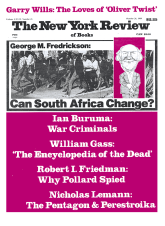To the Editors:
Unlike any other nation, Cuba has embarked on a program to control AIDS that is designed to limit the spread of infection with the human immunodeficiency virus (HIV) by invoking the compulsory elements of the public health tradition. Widespread screening for HIV infection began in Cuba four years ago, and persons identified as infected have been sent to a sanatorium located in a Havana suburb. This unique reliance on a modified quarantine extends to all HIV-infected persons. I reported on the Cuban system of quarantine in the New England Journal of Medicine on April 13, 1989 (“Controlling AIDS in Cuba: The Logic of Quarantine”).
While at a meeting in Geneva at the end of July sponsored by the World Health Organization Global Programme on AIDS and the UN Commission on Human Rights, I met Mr. H. Daniel, a former Brazilian revolutionary, who subsequently spent seven years in political exile. He was interested in the work I had done on AIDS in Cuba and told me that he had just sent a letter to President Fidel Castro denouncing the quarantine. I asked him if he would translate the letter from Portuguese so that I might make it available to American readers….
Ronald Bayer
Columbia University
New York City
Compañero Fidel Castro,
Instead of mailing an appeal to the leader of the admirable Cuban people, I would prefer to address myself to my compañero. I want to speak to you as I would if we had met along one of the paths of the Latin American Revolution of the 1960’s, feet still grimy with mud, with hope arming the guns in our hands and our spirits full of your words telling us that it was possible to transform the world, to make it more beautiful.
I was an armed rebel, a sincere follower of Ché Guevara. Today I am one of the thousands of Brazilians living with AIDS. Unfortunately I live in a country misgoverned by authoritarianism and by incompetence, where public health has been deteriorating over the last decades. From the beginning, the AIDS epidemic was not taken seriously by our authorities. And, up to this day, there is nothing close to a national program to control the epidemic and to assist those with AIDS, even though Brazil is one of the countries most affected by this illness in the world. Beyond this, old prejudices against gays are added to the new stigmas that mark this recent global epidemic, stigmas which marginalize the person with AIDS. Deprived of basic human rights, the person with AIDS experiences a de facto civil death.
Since I discovered that I had this illness, I have struggled to prove that I am alive and that I have no deficiency that would prevent me from exercising my civil rights. So much so that I have accepted the offer of the Green Party to be its symbolic candidate for the Presidency of the Republic, in order to alert the Brazilian society about fundamental political issues in the construction of democracy, a system in which everyone fully exercises the right to individual differences in the permanent struggle against all social inequalities.
I have followed with great sorrow the Cuban initiatives in relation to AIDS. From Cuba especially, I hoped for a great example in the search for solutions to this very grave public health problem. Cuba could take pride in its health system. Could, if it weren’t for the way it treats those who are HIV seropositive, whether sick or not, burying them in an isolation which has no technical justification, which goes against all scientific advice and which seriously infringes on human rights.
Cuba has used, in an abusive manner, compulsory HIV tests and has incarcerated those who test positively. Thus Cuba seeks to combat the virus by combatting those people whom the virus attacked. In this way, Cuba is defeated by the HIV virus and by the ideological virus of prejudice and discrimination. There are no possible arguments to defend these positions, except for those based on the most reactionary forms of prejudice against gays.
Certainly Cuba will soon discover that these measures are counterproductive: people with AIDS will be placed in the position of enemies, even more difficult to locate, and the epidemic will not be overcome. The only result will be to impose absurd suffering on those who today could easily contribute to control the epidemic, as has been happening in other countries of the world.
Whatever name is given to the concentration camps where those with AIDS are being imprisoned, the central problem is that these people are de facto political prisoners. In my name, in the name of the 10 million people with AIDS across the world, of their families and friends, in the name of all who believe in life as an act of freedom, I ask you, compañero Fidel, to change the Cuban AIDS program. First, it is necessary to free those political prisoners. Second, it is necessary to implement a program based on the revolutionary principle of solidarity.
I sincerely hope that Cuba will not permit itself to be defeated by prejudice.
H. Daniel
Rio de Janeiro, Brazil
This Issue
October 26, 1989



